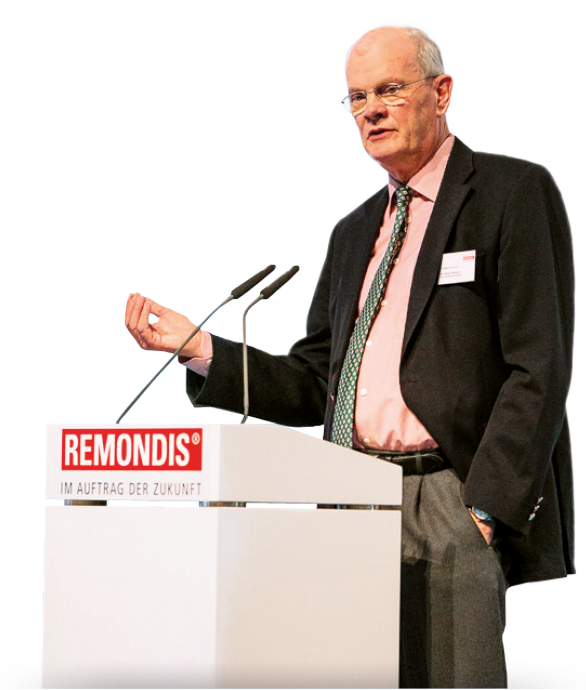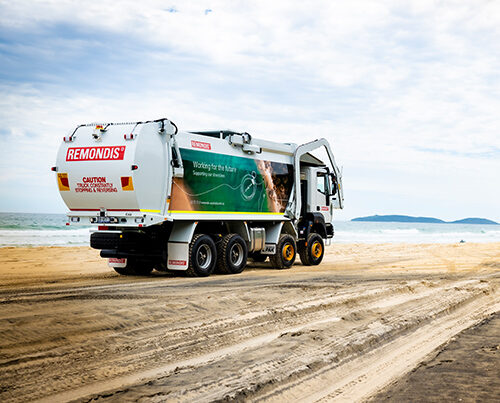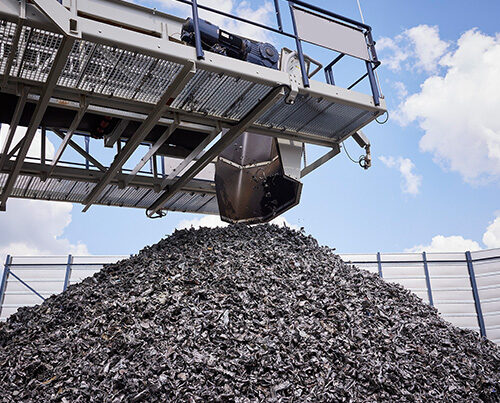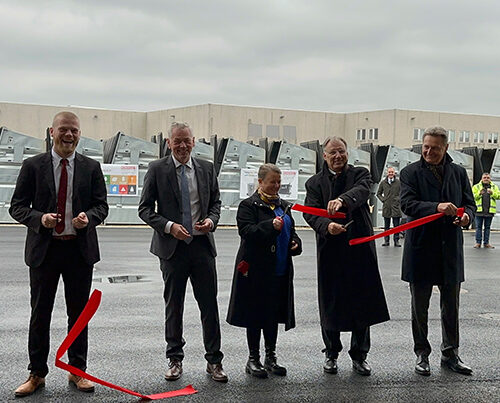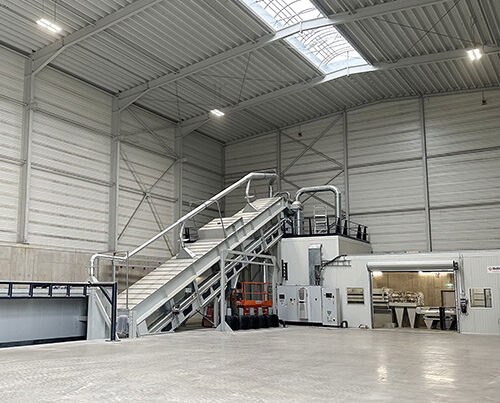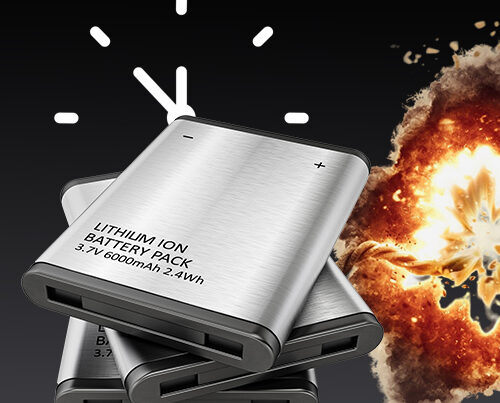Interview
Mr Rethmann, Plano’s 60th anniversary is also a celebration of plastics recycling. What was this time like for you personally when the first attempts were made to recycle plastic?
Norbert Rethmann: Plastic was the first material – apart from paper and glass –that I tried to recycle so that it could be reused. I knew that plastics recycling would be worth its while, I just didn’t know how to do it back then. With hindsight, it was a good thing that I didn’t know. Had I had the scientific basis for starting such a project, I wouldn’t have gone down that route at all. The challenge I had to face was adding my personal experience to theory and science. The first experiments that I carried out – which involved shredding the material, heating it up and stretching it – made it very clear that the biggest problem with recycling plastics would be removing the dirt stuck to the material. The method I used back then simply couldn’t produce the quality that customers expected to get. I had to clean the plastic beforehand and, as some people may remember, these experiments ended up ruining a number of my wife’s washing machines. What I learned though was that a much larger industrial washing machine would be able to remove the dirt and fat from old plastic products. This – together with an agglomerator and extruder – meant I really could make a marketable product.
How important have plastics been for you since then?
Norbert Rethmann: To begin with, plastics recycling at our company certainly had its ups and downs: after spending all that time and effort to find a process to recycle plastics, I came back from a trip to the USA only to find that the board member responsible for this business had closed down the whole of the plastics division. Of course, this step had been agreed on and the decision was, without a doubt, the right one from a business point of view. Despite this, I did not give up my plans because I was absolutely certain that this material would be extremely important in the future – both for the company and for German industry as a whole. Nowadays, we never use the word ‘plastic’ in the company. Instead we talk of PP, PE and PET. Very few materials are as versatile as plastic and many industries have discovered that they can use it, too. It has, therefore, become considerably more important.
How do you see plastics recycling developing in the future?
Norbert Rethmann: If Germany is to invest in modern plastics recycling, then it is essential that more thought is put into the design of products and packaging so that they are easier to recycle. The manufacturing industry must play their part here. What’s more, more must be done to promote the development of innovative technology that can sort and recycle the many different types of plastic. The plastics being installed in modern products are getting smaller and more complex which means new recycling techniques are needed to ensure they can be separated according to type. At the end of the day, this material can only be recycled if it can be sorted correctly. Consumers can help increase the use of recycled plastic simply by asking for and purchasing recyclable products.
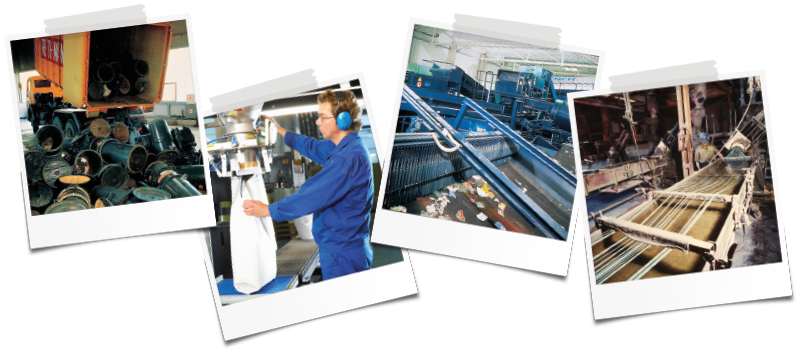
Old bins such as these (which used to be sent to landfill back then) were the catalyst that prompted Norbert Rethmann to look into how plastic might be recycled
Germany’s so-called ‘Dual System’ used to be known as the Green Point. Was the Green Point a step forward for plastics recycling?
Norbert Rethmann: The Green Point certainly acted as an important driving force for plastics recycling. Light sales packaging causes the biggest headache for our industry. There have been so many discussions about this type of waste. What’s the best way for it to be separated? Who does it belong to? Is it actually being recycled? The packaging industry and the recycling sector certainly have some controversial targets on their agenda which the Dual System must pool together and evaluate. However, I do believe that the fact plastic is actually being recycled can, for the most part, be put down to the efforts of the private sector companies in our industry. The primary driving forces behind plastics recycling are creating genuine material life cycles, improving recycling and vehicle technology and, ultimately, optimising new products. The role of the Dual System is to formally enforce the regulations and ensure there is competition – for example, recycling firms that do not operate their own dual system should also be allowed to recycle the sales packaging. The Dual System must establish the framework conditions. This is certainly an important role but has little to do with the actual recycling.
Looking at the environment, do you think plastic is a blessing or a curse?
Norbert Rethmann: Every single piece of plastic that ends up in the environment is a curse. It doesn’t degrade and is lethal for animals and soils as well as for our seas and oceans. Plastic is only a blessing if it is used as a recyclable material. Every tonne of recycled plastic reduces carbon emissions by 1.2 tonnes. Here in Germany, we are privileged to have a scheme that enables plastic to be collected, transported and recycled. We have been able to make it economically viable to recover, recycle and return plastics to production cycles. Many countries, unfortunately, have not reached this point yet. Plastic is most definitely a curse for them. It is destroying their landscape which is often their biggest asset – for example, for their tourist and fishing industries. We have to pass on our values regarding plastic to these countries to protect their inhabitants and environment. Having said that, we also need to raise awareness here in Germany: every summer, you can see huge piles of waste in our parks that have been carelessly discarded by the public. Some of this litter is bound to find its way into our sewer systems and end up in our rivers and, ultimately, in our seas and oceans.
Every single piece of plastic that ends up in the environment is a curse. It doesn’t degrade and is lethal for animals and soils as well as for our seas and oceans. Plastic is only a blessing if it is used as a recyclable material.
What decisions should politicians make to improve plastics recycling?
Norbert Rethmann: Brussels should introduce a Europe-wide ban on sending plastic to landfill. With natural resources becoming either scarcer or more expensive, there is a growing awareness across Europe that waste should be seen as a source of raw materials that could be reused in the country. What’s more, it would be great if manufacturers were made responsible for ensuring their products can be recycled. And businesses should be rewarded for using recyclable materials. This would help prevent naturally sourced raw materials, which cannot be recovered from composite materials, from being wasted. Recycled raw materials are the best way to promote sustainable development – an argument that is becoming ever more important on the market.
